Climbing to the top of Mount Everest
Summiting Mount Everest, the world’s highest peak, is a dream shared by many. Countless climbers have attempted to reach its summit to hoist their country’s flags. Yet, each journey is unique, and so is the story of Suvidha Kadlag. From a dream to serve her nation to proudly carrying her roots and Maharashtra’s culture to Everest and gaining recognition for it, her journey is a beautiful dream that came to a reality. This is not just any dream, but one chased by a mother determined to empower other women. With pride, she carried the woman in a saree to the peak, sending the message that if she chooses to dream and fight, she can overcome any circumstance or hurdle, especially with the support of her family behind her.
- Mrunal
- August 25, 2025
Boss Naari: Hello, What was the starting point of your journey? Did you always dream of doing something adventurous like mountaineering, or did that passion evolve over time?
Suvidha: I always wanted to do something. Being a daughter in a family where girls weren’t allowed to do much, I always had an incomplete dream of doing something meaningful for the nation. I wanted to join the armed forces.
At the age of 24, I got married and I knew that dream could never be fulfilled. That door had shut.
For a woman who wanted to pursue sports or something extreme, people would say that if she is into sports, she wouldn’t be capable of motherhood. After marriage, a woman is expected to cook and clean like a maid. So what’s the point of educating her or sending her to school? That was the kind of judgment people had before I got married, and that is why I was not able to pursue my dream.
So, I always had to prove that a woman could take care of responsibilities and still do something extraordinary. Society might have thought a woman could only manage a small, temporary job or serve her family. But for a woman to chase her dream? That wasn’t even considered. And to make that dream a reality felt like creating history in itself.
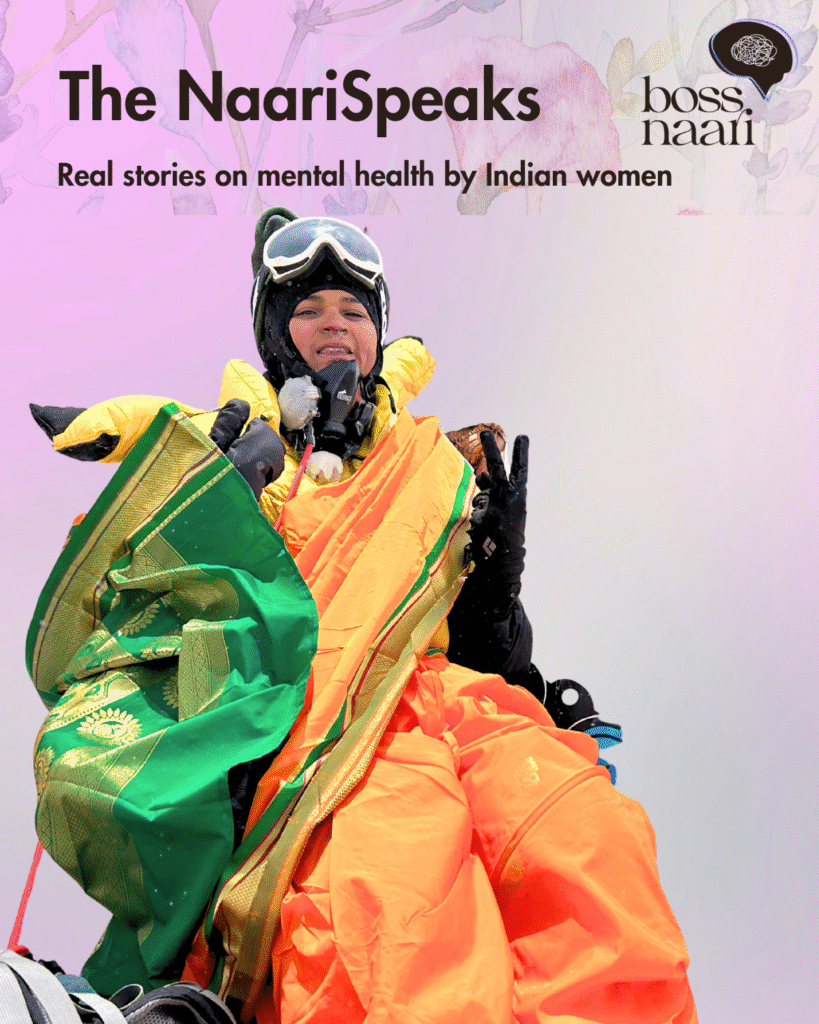
Boss Naari: As you mentioned, you faced a lot of societal judgment and couldn’t pursue your dreams at an early age. How did you hold on to your dreams through that resistance?
Suvidha: Yes, I wanted to do something extreme. Not just extreme but something unique and deeply meaningful to life itself.
In 2021, I remember the day our family lost my cousin at the Assam border, who was in an army. That incident changed everything for me. As I always wanted to do something for the nation, and when I lost my cousin brother who was in the army I wanted to pay him tribute.
then I realized that mountaineering was already a part of my life. And through it my dream to serve the nation would also come true. While mountaineering was something that still lacked public attention, support, and understanding. But it had the potential to awaken something powerful. That’s when I decided to head to the Himalayas.
For me, the mountains are like a teacher. They’ve trained me, nurtured me, and given me a sense of motherhood. They’ve helped me build endurance and shown me my true strength. I thought, “Yes, maybe this is the way I can serve my purpose.” I always wanted to serve the nation, and even if I wasn’t allowed to do so, I could find my own path through mountaineering.
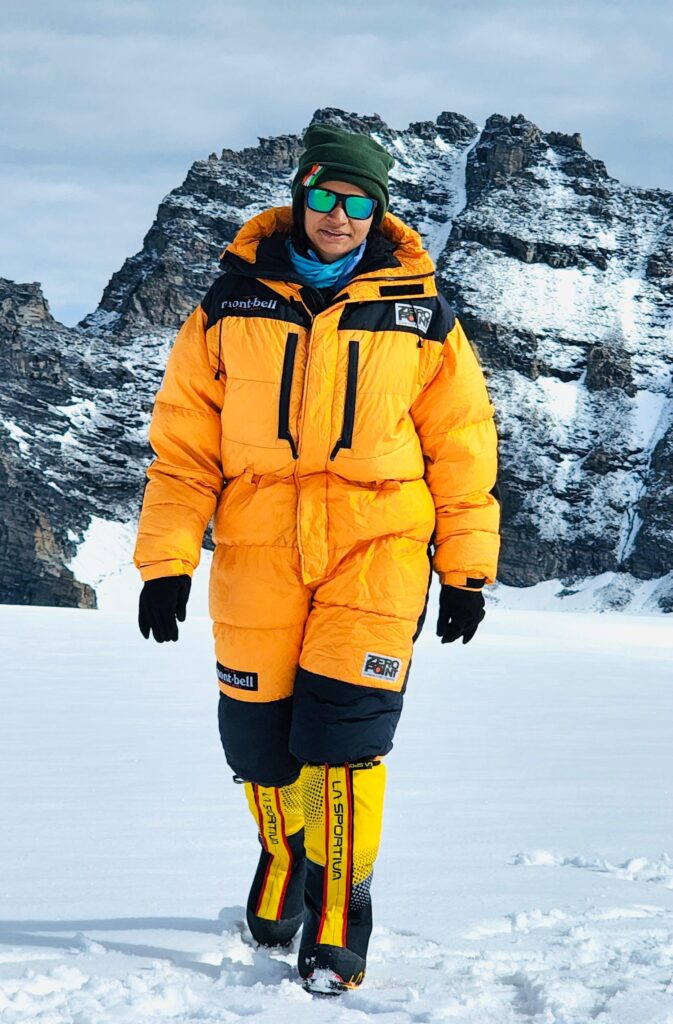
Suvidha in her mountaineering attire at Mount Everest.
Boss Naari: Was there a particular moment during your journey when you felt a deep connection to the mountains and knew Everest had to be part of your path?
Suvidha: For me mountaineering is not just a sport. A mountaineer is someone who serves society, often without any recognition, and reaches places where most people can’t. They rescue, they explore, they survive extreme challenges. That in itself is a form of national service.
Also, mountaineering gives global recognition through breathtaking landscapes, terrains, and trails that few dare to visit. So I thought, “Why not create a platform for women to explore this world too?” That’s how the idea of climbing Everest came to me and not only climbing it but taking our culture to it came.
I met people who told me, “I saw you running behind this goal even three years before you thought of Everest. You were already building something for society through mountaineering.” And I always replied, “To be a true mountaineer takes years. I still consider myself a learner.”
This journey for me is not limited to just climbing Everest. It’s about what comes after. Because if this journey doesn’t lead to education, empowerment, or creating a platform for other women, then what’s the point? I want this journey to create something bigger, a platform for women’s empowerment. A space where women get the support they need to explore high altitudes and reach for their dreams, just like I did.
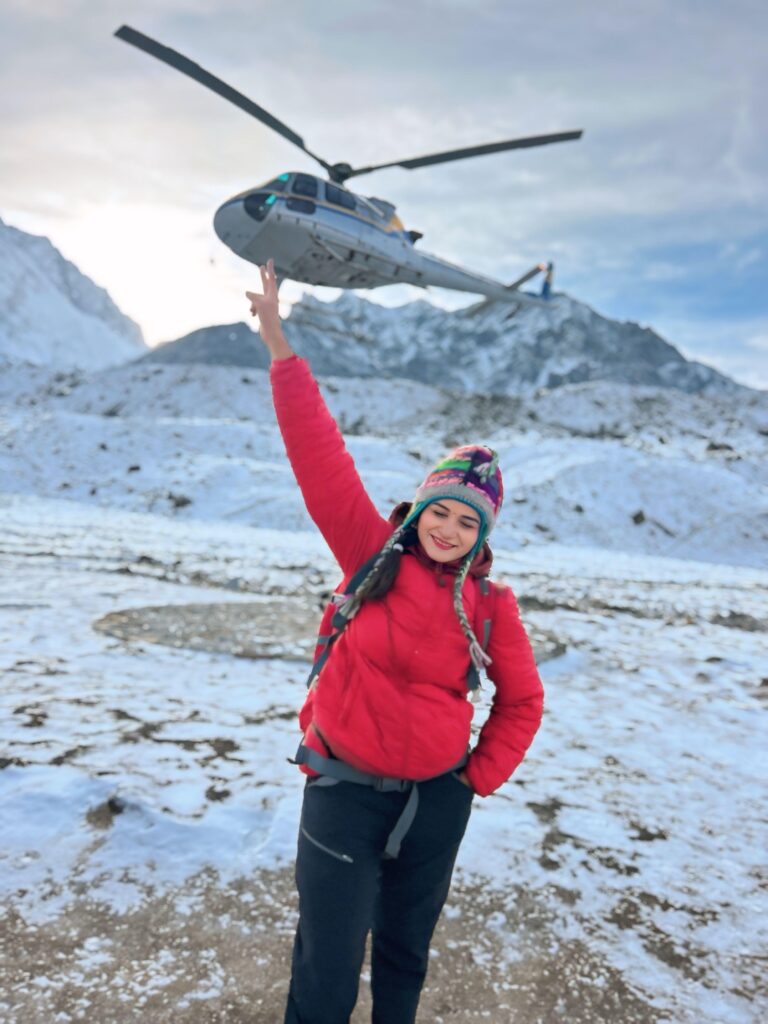
A snapshot of Suvidha taken as a chopper passes over Everest.
Boss Naari: Taking culture to Everest is such a powerful idea. What inspired you to carry the traditional Maharashtrian Navari saree to the summit, and what was that experience like? Was it difficult?
Suvidha: I must say one thing, it’s not difficult. It’s just about habit. The first period is difficult, right? It’s painful. But once you get used to it, it becomes normal. That’s what I meant with that example. If you get habituated to something difficult, you get used to it.
So how difficult is it really to carry your culture, your roots, wherever you go? I didn’t climb Everest wearing the Navari saree. I reached the top and then wore it. While climbing, wearing a saree is not practical. You wear crampons, which are open metal spikes, and they could easily get caught in the saree. That could lead to a serious accident. So instead, I decided to carry the saree with me and drape it at the summit.
For me, taking our culture with me and more than that, taking the woman who wears it was important. I wanted to represent that woman, the one who wears a Navari saree every day in rural India, works in the fields, and endures harsh conditions. I wanted to take her to the top of the world with me.
Seeing that idol of a woman in a Navari saree at the summit, visualizing her strength and grace at that height, was my dream. Sitting at the summit, draped in a Navari, and watching that unbelievable dream come true, that moment meant everything to me.
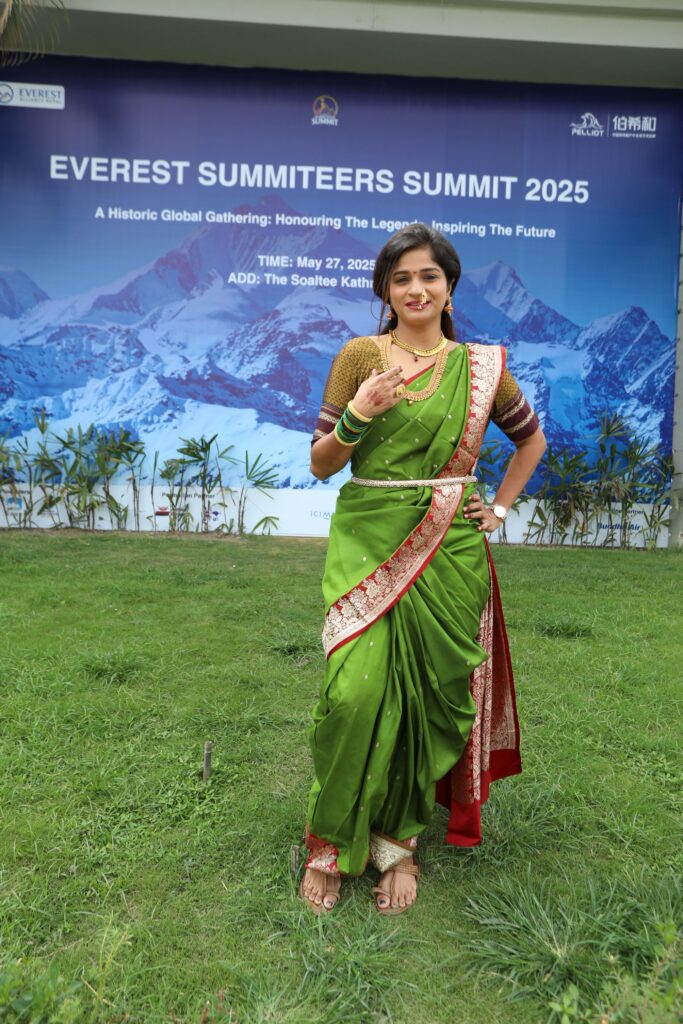
Suvidha in Navari saree in an Everest Summiteers Summit in Nepal.
Boss Naari: When you were standing on top of the mountain, surrounded by clouds and those majestic white peaks, how did it feel? Was it emotional? Did it feel like an accomplishment?
Suvidha: The summit felt entirely different. I felt deeply connected to my father at that moment as I had lost my dad when I was kid. During my childhood, I hardly got to spend time with him, just a few years. So whenever I faced difficulty, I used to imagine meeting him, telling him, “See, I’m suffering, I’m trying, and I want to overcome this.”
And that day, when I reached the summit, I felt like I was with him. Surrounded by fog, I almost imagined hugging him. I thanked Nature and Mother Earth and I did it in Marathi, because that language carries an emotion that’s very personal to me.
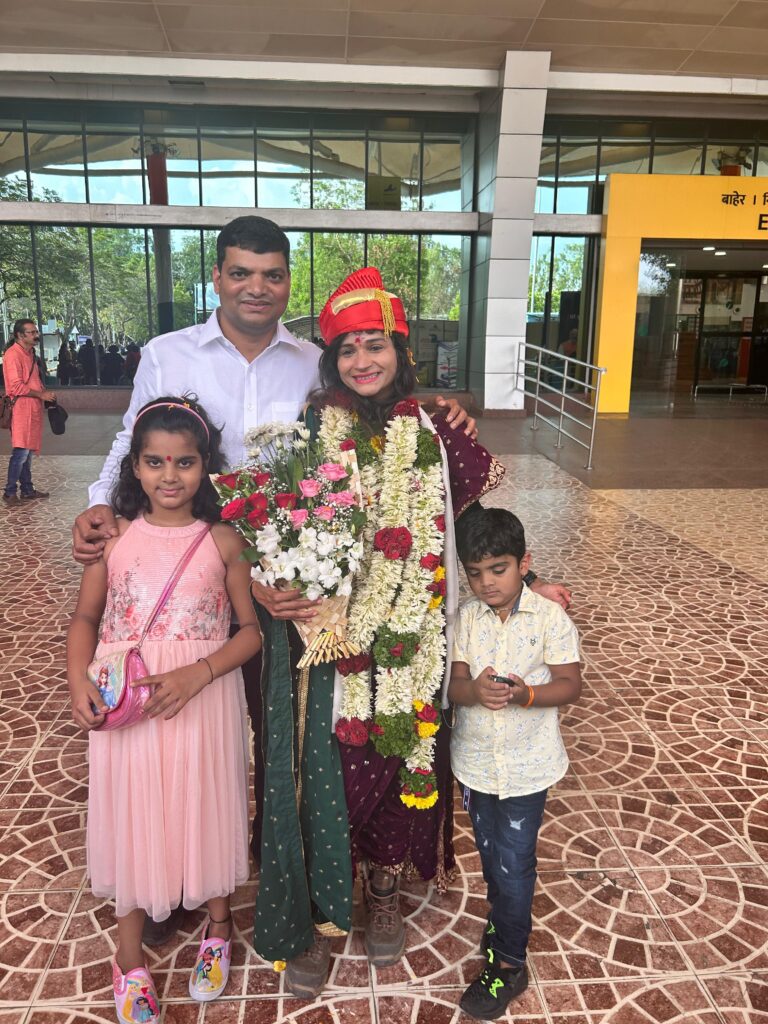
Welcome by Suvidha’s family at Pune Airport after a successful return from the summit.
Boss Naari: What was that moment of gratitude like? Did it feel spiritual?
Suvidha: Yes, very much. I also felt proud, not for myself, but for our history. If we go back to history, we’ll see how warriors from different states of India came to Chhatrapati Shivaji Maharaj to learn from him, to understand how they could protect their own lands better.
So for me, this energy, this strength, came from Maharaj. I didn’t conquer the mountain. I summited on it. And I am grateful the mountain allowed me to stand on its peak.
Boss Naari: After such a historic climb, did you receive any recognition for your achievement? Was there ever a suggestion to register it with something like the World Book of Records?
Suvidha: Yes, my achievement was qualified for the Book of Records. I was told I must go for the World Book of Records and register for it by paying upfront cash.. But honestly, I didn’t feel the need to do that.
There’s a saying in Marathi, “Chandrala talhatane jhakta yet nahi” which means you can’t hide the moon with your palms. If your work is genuine and meaningful, it shines on its own.
My achievement didn’t need me to chase recognition. Instead, recognition came to me. In Nepal, the Everest Alliance itself honoured me. They officially declared that this was the first-ever summit where Indian culture, represented through the Navari saree, was taken to the top.
And that declaration happened in front of hundreds of men and women mountaineers. For me, that meant everything. That was my moment, not a paid certificate, but a heartfelt acknowledgment from the mountain itself.
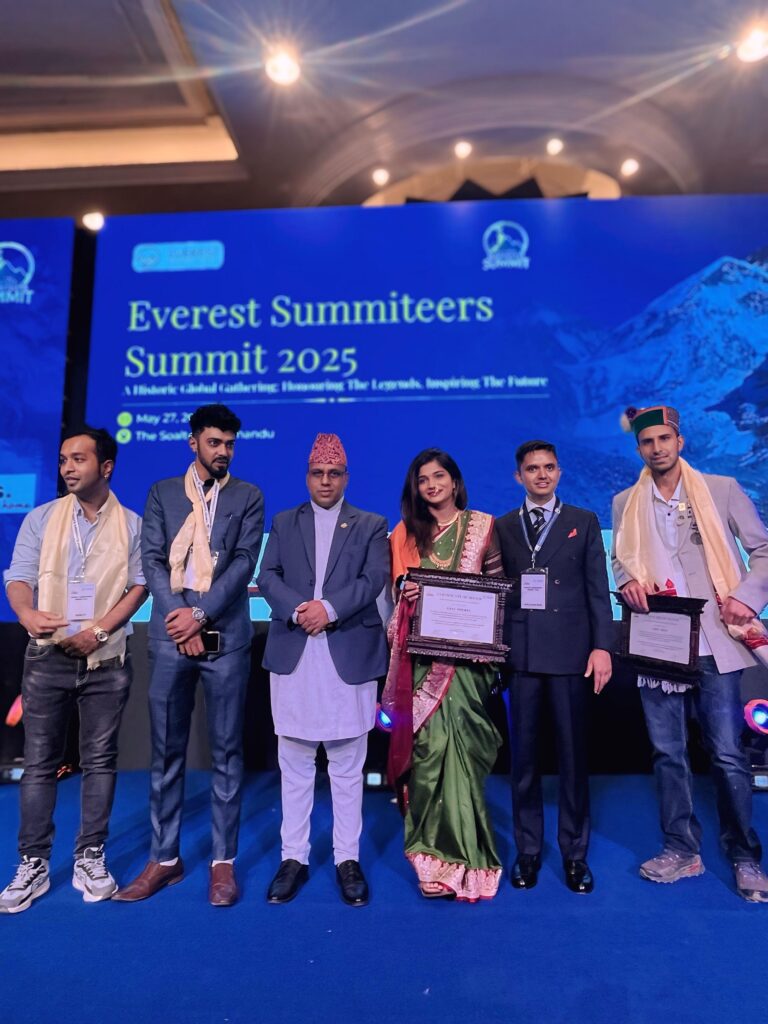
Suvidha was honoured by the Everest Alliance for being the first to take culture to Everest.
Boss Naari: Your discipline is truly inspiring, balancing motherhood with intense training and mental preparation. How do you manage to juggle all these demanding roles as a mother of two?
Suvidha: Being a mother doesn’t hold you back. It shapes you. It gives you a reason to push harder.
I used to wake up at 4 AM. Spiritually, that time is sacred. No calls, no distractions, only connection with God. That’s when I would speak to God, tell Him what I wanted to achieve, and affirm my purpose in life. And start my workout.
Motherhood gave me direction. I didn’t climb mountains to escape from my responsibilities. I climbed so I could set an example for my children. I wanted them to be chasing something difficult. They learned that dreams aren’t distractions, they’re directions. I didn’t step away from them. I showed them how to step up for what matters.
There were times I had to be away, out in the mountains, at marathons, or attending different events. In those moments, I wasn’t physically present for my kids, but I always knew they were safe. That’s the strength of womanhood. When one woman steps out, others step in.
My mother stepped in every time I had to go for a climb or leave home for training or responsibilities. She never let me feel like I had to choose between my dream and my children.
My husband too took on responsibilities, from buying groceries to handling daily chores, things that are often silently expected from a woman.
And for that, I’m truly thankful. I believe God has gifted me this family, one that didn’t just support my dream but allowed it to fly.
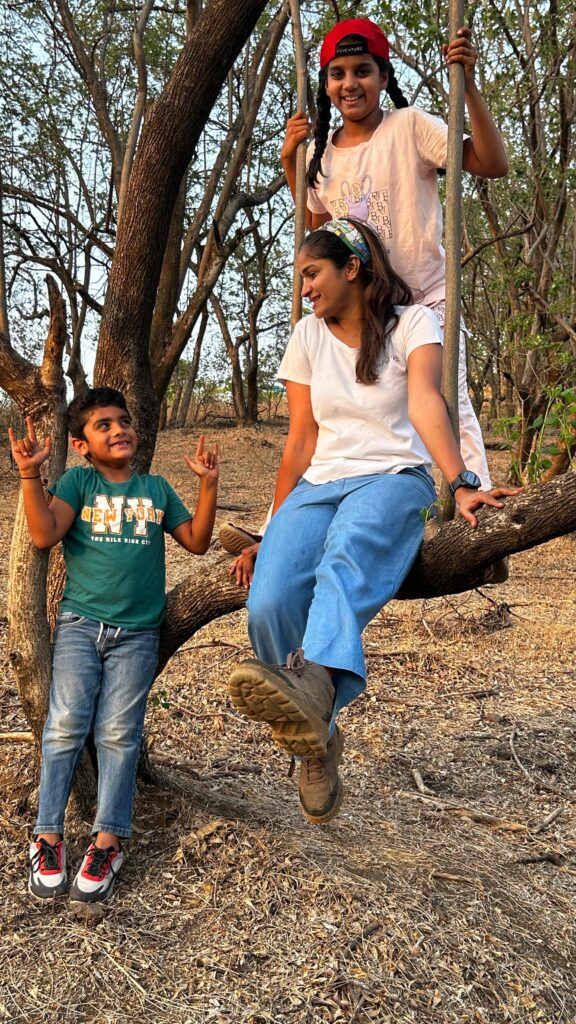
Suvidha enjoying with her kids.
Boss Naari: Looking back, what would little Suvidha have thought about standing on top of the world?
Suvidha: As a little girl, I didn’t fully understand what I was meant to do. But I always wanted to do something extraordinary, something that would support and uplift my community.
Mountaineers in Maharashtra have been struggling for recognition for a long time. I never had the opportunity to reach a proper platform that could certify and empower women, for women. But even as a child, I knew I wanted to do something for my country. That was the purpose I held in my heart.
And I believe I served that purpose by standing at the summit of Mount Everest, carrying with me our Indian culture. India became the first country whose traditional culture was represented at the top of the world and I was proud to be the one to do it.
Boss Naari: You’ve already conquered Everest. What’s next on your mountaineering dream list?
Suvidha: I wish to summit Kanchenjunga, which is India’s highest peak and the third-highest in the world. I also have a desire to climb Annapurna, a thrilling and technically challenging mountain. And if the mountains allow me, I would love to climb all the 8,000-meter peaks possible in my lifetime.
But my dream isn’t just about climbing. It’s also about creating a platform for others.
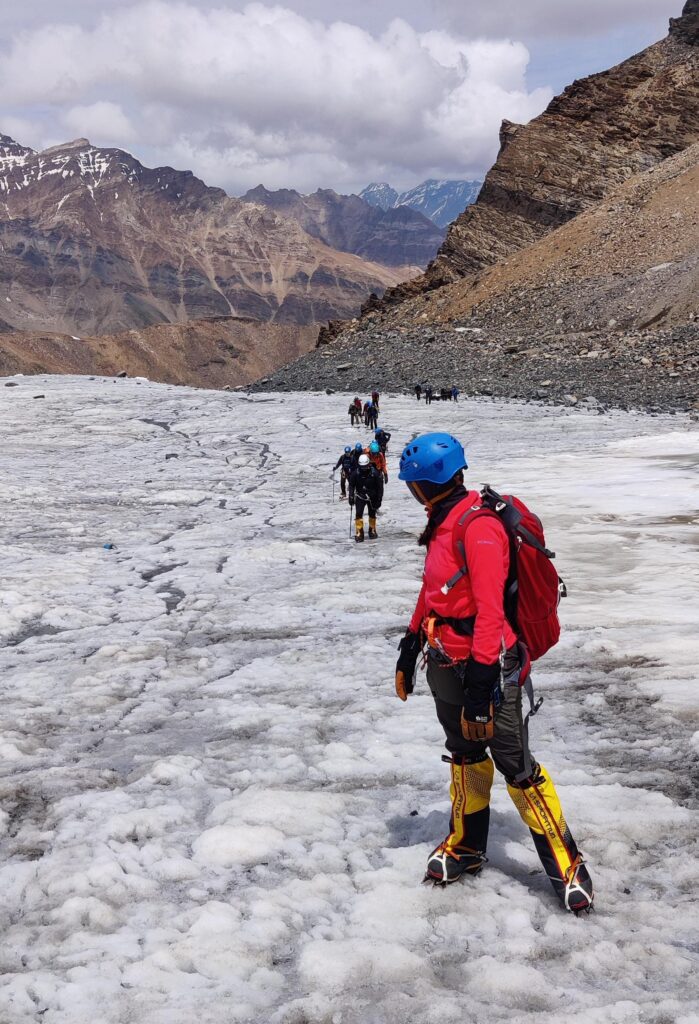
A snapshot taken while climbing the snowy slopes of Mount Everest.
Boss Naari: That’s incredible. Tell us more about this platform you want to create. What’s the vision?
Suvidha: I want to establish an adventurous and land adventure training institute based in Maharashtra. I’ve experienced how difficult it is, especially for women, to leave their families or even their state for 21 days or more just to complete one course. I did it, and I know how tough it can be.
So I want to make it easier. I want this institute to offer several certified mountaineering and adventure courses, including basic, advanced, and rescue training, everything a passionate person would need to get started, especially women who often put their dreams on hold.
My goal is to bring mountaineering opportunities to people who’ve only dreamed of them, and to give courageous women a platform where they too can achieve goals like mine.
Boss Naari: If a young girl looks at your photo from Everest and dreams of doing something equally bold, what’s the one piece of advice you would want to give her?
Suvidha: Don’t wait for the world to tell you you’re ready. If your heart is calling, start climbing, whatever your mountain is. Wear your dreams like you wear your saree, with pride, with strength, and with no apologies.
Want to be featured on NaariSpeaks?
Do you have a story that could inspire another woman or help someone going through a similar journey? We’d love to hear from you and share your voice with our community.
Liked what you read?
Sign up and get the latest blog posts delivered straight to your inbox.
We respect your privacy
Related Arcticles

Down syndrome didn’t define her; dance did
Down syndrome didn’t define her; dance did Dance became the language of Sayalee Agavane, a Down Syndrome professional dance artist who has transformed every stage

Raising a child with Down Syndrome
Raising a child with Down Syndrome Parenting a child with Down syndrome is a journey filled with unique experiences, and the early days of acceptance

Living with extra chromosomes
Living with an extra chromosome Down syndrome cannot stop anyone from achieving their dreams, and Madhumati Indalkar is a beautiful example of that. Madhumati has
